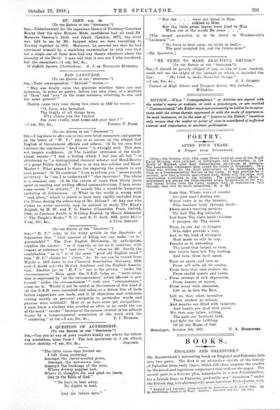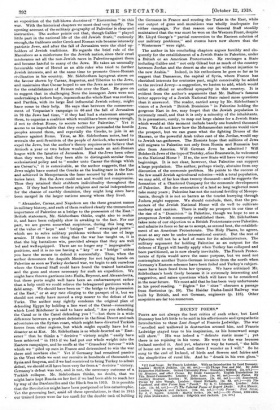BOOKS.
ENGLAND AND PALESTINE.* Ma. SIDEBOTHAM'S interesting book on England and Palestine falls into two parts. The first is an attractive sketch of the history of Palestine from early times, which will often surprise the erudite by the novel and ingenious conjectures that enliven the pages. The second part is a fervent plea, remarkable in a non-Jewish author, for a Jewish State in Palestine, preferably as a "Dominion " under the British flag, but alternatively as an American Protectorate, with
• England and Palestine : Essay towards the Restoration of the Jewish Stale. By H. Sidebotham (Student of War). London : Constable and Co. (Os, net.)
an exposition of the full-blown doctrine of" Easternism this
war. With the historical chapters We must deal very briefly. The opening account of the military geography of Palestineis clear and instructive. The author points- out that, 'though Galilee " played little part in the national life of the old Jewish StatS," curiously enough,the Galileans under Greek and Roman rule became intensely patriotic Jews, and after the fall of Jerusalem welt) the chief up- holders of Jewish traditions. He regards the brief rule of the Maccabees as a misfortune for the Jewish nation, since their cruel intolerance set all the non-Jewish races in Palestine against them and became hateful to many of the Jews. He takes an unusually favourable view of Herod as an able ruler who tried to further Jewish interests, and at the same time to promote Greco-Roman civilization in his country. Mr. Sidebotham lays great stress on the favour shown by Caesar, Augustus, and Tiberius to the Jews, and maintains that Caesar hoped to use the Jews as an instrument for the establishment of Roman rule over the East. He goes on to suggest that in challenging Nero the insurgent Jews were not undertaking a forlorn hope, inasmuch as the whole East was restless, and Parthia, with its large Lad influential Jewish colony, might have come to their help. He says that between the commence- ment of Vespasian's campaign in 66 and the fall of Jerusalem in 70 the Jews had time, "if they had had a statesman amongst them, to organize a coalition which would have been strong enough, if not to defeat Rome, to secure terms for Palestine." Yet it seems to us improbable that they could have persuaded the hostile peoples around them, and especially the Greeks, to join in an alliance against Rome. Titus, as Mr; Sidebotham notes, had to restrain the anti-Semitistn of the people of Antioch, who wanted to expel the Jews, but the author's theory requires us to believe that Antioch a year or two before would have made an anti-Roman league with the fanatics of Jerusalem. Had the Jews been other than they were, had they been able to distinguish secular from ecclesiastical policy and to "render unto Caesar the things which are Caesar's," it is conceivable, as the author suggests, that the Jews might have ousted the Greeks as the leading race in the East and achieved in Mesopotamia the fame secured by the Arabs cen- turies later. But the Jews could not and would not compromise. Thus they retained their stubborn individuality throughout the ages. If they had bartered their religious and racial independence for the chance of earthly dominion, they might long since have been merged in the larger nations among whom they lived.
"Alexander, Caesar, and Napoleon are the three greatest names
in military history, and each of them realized clearly the tremendous
importance of Palestine as a bridge to the possession of the East."
British statesmen, Mr. Sidebotham thinks, ought also to realize it, and have been culpably slow in awaking to the fact. For our part, we are grown somewhat suspicious, duriqg this long war, of the value of " keys " and " bridges " and "strategical points" which are to solve military problems without the use of large armies. If there is one thing that the war has taught us, it is that the big battalions win, provided always that they are well
led and well equipped. There are no longer any" impregnable" positions, and it is no use having a " key " or a " bridge " unless you have the means to defend it successfully. Thus, when the author denounces the Asquith Ministry for not laying hands on Palestine as soon as Turkey declared war, we begin to ask ourselves where the General Staff could have found the trained battalions and the guns and stores necessary for such an expedition. We might have thrown garrisons into Haifa, Beyrout, and Alexandretta, but these ports might well have been an embarrassment rather than a help until we could relieve the beleaguered garrisons with a field army. We should have been on" the bridge to the possession of the East," or at any rate clinging to the parapet of it, but we should not really have moved a step nearer to the defeat of the Turks. The author may rightly condemn the original plan of defending Egypt by holding a line west of the Canal—concerning which Lord Kitchener is said to have asked, "Are you defending the Canal or is the Canal defending you ? "—but there is a wide difference between a prudent defensive in the Sinai Desert and rash adventures on the Syrian coast, which might have diverted Turkish forces from other regions, but which might equally have led to disaster as at Kut. Mr. Sidebotham is so whole-hearted an " East- erner" that he thinks a " decisive " victory might "easily have been achieved" in 1915 if we had put our whole weight into the Eastern campaigns, and he scoffs at the" Crusaders' fervour" with which we "piled up men in France and determined to win the war there and nowhere else." Yet if Germany had remained passive in the West while we sent our recruits in hundreds of thousands to Syria and Smyrna, and if-we had contrived to bring Turkey to admit defeat, we should still h,ave been very far from a" decisive "victory. aermany's defeat was not, and is not, the necessary outcome of a Turkish collapse. Mr. Sidebotham thinks, no doubt, that we might have kept Russia on her feet if we had been able to reach her by way of the Dardanelles and the Black Sea in 1915. It is possible that the Revolution might have been postponed or less catastrophic. Yet the governing fact, amid all these speculations, is that in 1915 our trained forces were far too small for the double task of holding
the Germans in France and routing the Turks in the East, while our output of guns and munitions was wholly inadequate for either campaign. • For that reason our General Staff steadily maintained that the war must be won on the Western Front, despite Mr. Lloyd George's "partial conversion to the Eastern solution of our military problems," and events have now shown that the " Westerners " were right.
The author in his concluding chapters argues forcibly and elo- quently fer the establishment of a Jewish State in Palestine, under
a British or an American Protectorate. He envisages a State including Galilee and " not only Gilead but as much of the country between Jordan and the desert as she can get without injustice to the new Arabia." Indeed, in his enthusiasm he goes so far as to suggest that Damascus, the capital of Syria, where France has cherished interests for centuries past, might conceivably be added to the revived Jewry—a suggestion, we hasten to add, which would enlist no official or unofficial sympathy in this country. It is evident from the author's arguments that Mr. Balfour's famous letter approving of a Jewish National State raised more questions than it answered. The reader, carried away by Mr. Sidebotham's vision of a Jewish "British Dominion" in Palestine holding the gorgeous East in fee, may forget that the Jewish population is extremely small, and that it is only a minority of the inhabitants. It is premature, surely, to map out large claims for a Jewish State which would at this moment include barely one hundred thousand Jews. We do not know how the Mohammedan nations would view the prospect, but we can guess what the fighting Drums of the Hauran, or the powerful Arab tribes east of the Jordan, would say to Jewish tax-gatherers. The Zionists hope that millions of Jews will migrate to Palestine not only from Russia and Rumania but also from America. Will German Jews be admitted ? Will Bolshevik Jews of the type of Trotsky, alias Braunstein, be welcomed in the National Home ? If so, the new State will have very stormy beginnings. It is not clear, however, that Palestine can support a large population. The author, perhaps wisely, abstains from any discussion of the economic problem. He points to the success of the few small Jewish agricultural colonies—with a total population, we may add, of far less than twenty thousand—and he suggests the formation of a Chartered Company for the economic development of Palestine. But the restoration of a land so long neglected must take many years ; Palestine has not the natural fertility of Mesopo- tamia, though it is not so barren as the tourist hurrying through Judaea "night suppose. We should conclude, then, that the pro- moters of the Jewish National Home will do well to cultivate modesty and caution. There is really no prospect in our time of the rise of a " Dominion " in Palestine, though we hope to see a prosperous Jewish community established there. Mr. Sidebotham takes note of our objection to a British Protectorate over Palestine, and admits its force so far as to accept, as second best, the establish- ment of an American Protectorate. The Holy Places, he agrees, must at any rate be under international control. But the rest of Palestine will not be a bed of roses for its administrators. The military argument for holding Palestine as an outpost for the defence of Egypt will hardly apply when Turkey has collapsed and been partitioned, as is now clearly inevitable. The French Protec- torate of Syria would serve the same purpose, but we need not contemplate another Turco-German invasion from the north when Germany's Eastern schemes have been foiled and Turkey's subject. races have been freed from her tyranny. We have criticized Mr. Sidebotham's book freely because it is extremely interesting and suggestive, and raises questions which will have to be considered in the near future. We must add that he has been very unfortunate in his proof-reading. " Rights " for " rites " obscures a passage from Suetonius (p. 59). The Haider Pasha-Ismid Railway was built by British, and not German, engineers (p. 125). Other misprints are far too numerous.



































 Previous page
Previous page